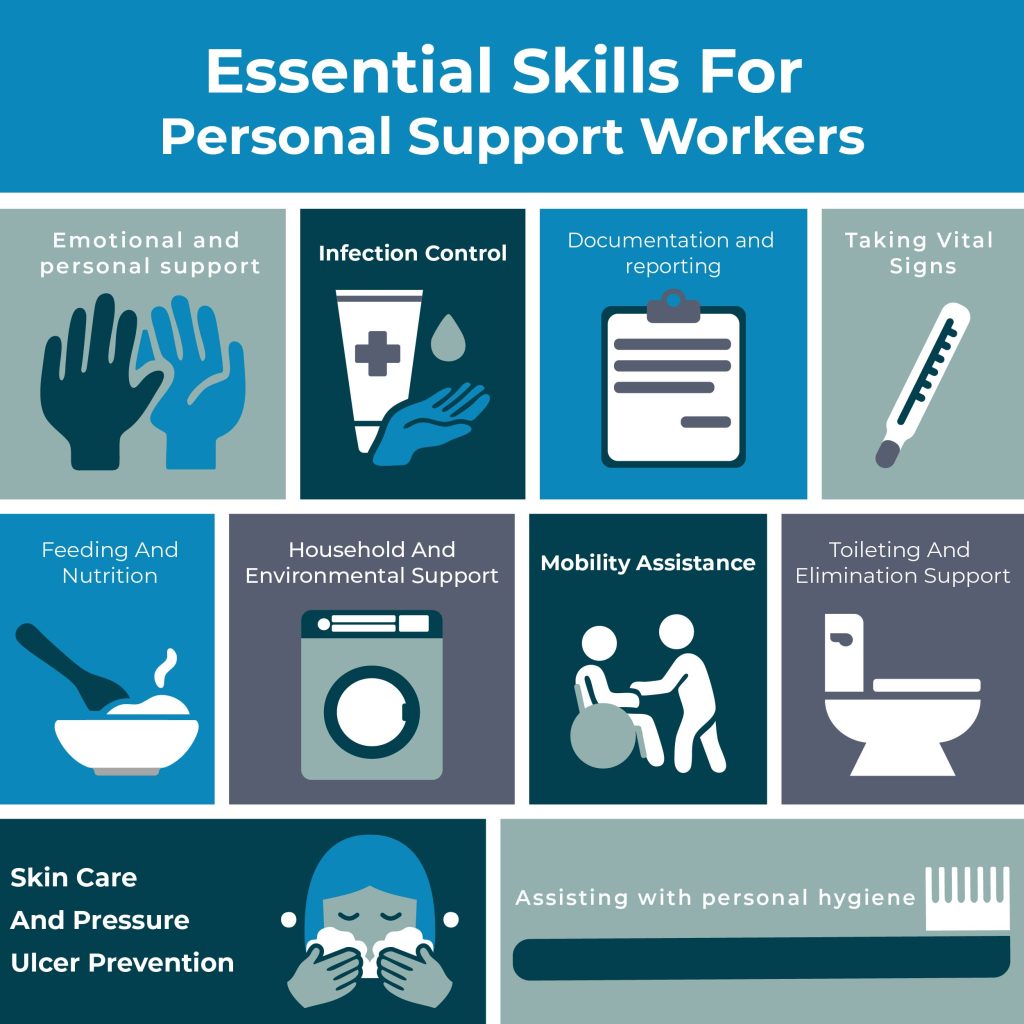5.3 Clinical Skills Resources
Throughout the Clinical Professional Practice Placements, PSW students will continue to expand on the clinical skills they have obtained in the classroom and lab setting. Students will become more aware of and participate in the application of many of these skills throughout the PSW program. These will be evaluated and are included the PSW student expectations provided in the Domains of Practice Competencies.

PSW Clinical Skills
Documentation and Communication Skills
- Active Listening and clear verbal communication
- Basic writing for documentation and reporting
- Understanding non-verbal cues and adapting communication styles
- Demonstrating honesty and integrity in all aspects of communication
Clinical Skills
- Assisting with personal hygiene, mobility, and nutrition
- Assisting with walking and transferring (bed to chair, etc.)
- Using mobility aids (walkers, canes, wheelchairs)
- Repositioning in bed or chair to prevent pressure sores
- Monitoring vital signs (e.g., temperature, pulse, respiration)
- Using assistive devices and mechanical lifts safely
- Infection prevention and control practices
- Feeding a client
- Bathing a client: bed bath, tub bath, shower, and hair washing
- Perineal care and incontinence care
- Oral hygiene (brushing teeth, denture care)
- Nail care (filing, cleaning, no cutting unless trained and permitted)
- Shaving (electric shaver only)
- Positions, lists, transfers, moves, and ambulates clients by using proper assistive equipment and supplies, and based on the client’s care plan
- Assisting with toileting (commode, bedpan, urinal, changing incontinence products, catheter care – monitor and empty drainage bags)
- Helping clients choose appropriate clothing
- Assisting with putting on and removing clothes
- Supporting clients with adaptive clothing or mobility limitations
- Preparing and serving meals/snacks
- Feeding assistance (including clients with dysphagia)
- Monitoring food and fluid intake
- Following dietary restrictions or special diets
- Monitoring skin integrity and signs of infection or injury
Cognitive and Emotional Support
- Supporting clients with dementia, mental health conditions, or cognitive impairments
- Providing companionship and emotional reassurance
- Recognizing signs of distress or behavioural changes
- Caring while demonstrating honesty, integrity, and respect
- Confidentiality
Organizational Skills
- Time management and prioritization of tasks
- Following care plans and schedules
- Managing supplies and equipment efficiently
Emergency Response
- First aid and CPR BLS
- Recognizing and responding appropriately to medical emergencies
- Observing and reporting changes in physical or mental condition
Infection Control & Safety
- Practicing proper hand hygiene and PPE use
- Cleaning and disinfecting equipment and surfaces
- Following standard and transmission-based precautions
- Ensuring a safe environment (fall prevention, hazard awareness)
Activity: Essential Skills
Activity Description
- Taking Vital Signs
- Blood pressure
- Pulse
- Respirations
- Temperature
- Assisting with Personal Hygiene
- Bathing (bed, tub, or shower)
- Oral care (including dentures)
- Perineal care
- Grooming and dressing
- Mobility Assistance
- Safe transferring (bed to chair, wheelchair, etc.)
- Use of mechanical lifts (e.g., Hoyer lift)
- Ambulation support
- Range of motion exercises
- Feeding and Nutrition
- Assisting with meals
- Feeding clients with swallowing difficulties
- Monitoring intake and output
- Following dietary restrictions
- Toileting and Elimination Support
- Assisting with bedpans, urinals, and commodes
- Changing incontinence products
- Catheter care (non-sterile)
- Monitoring bowel movements
- Skin Care and Pressure Ulcer Prevention
- Repositioning clients
- Applying barrier creams
- Observing and reporting skin changes
- Household and Environmental Support
- Making beds (occupied and unoccupied)
- Light housekeeping
- Laundry and tidying client spaces
- Documentation and Reporting
- Recording care activities
- Reporting changes in client condition
- Communicating with the care team
- Infection Control
- Hand hygiene
- Use of personal protective equipment (PPE)
- Cleaning and disinfecting equipment
- Emotional and Social Support
- Providing companionship
- Supporting mental well-being
- Respecting cultural and spiritual needs
- Taking Vital Signs
- Blood pressure
- Pulse
- Respirations
- Temperature
- Assisting with Personal Hygiene
- Bathing (bed, tub, or shower)
- Oral care (including dentures)
- Perineal care
- Grooming and dressing
- Mobility Assistance
- Safe transferring (bed to chair, wheelchair, etc.)
- Use of mechanical lifts (e.g., Hoyer lift)
- Ambulation support
- Range of motion exercises
- Feeding and Nutrition
- Assisting with meals
- Feeding clients with swallowing difficulties
- Monitoring intake and output
- Following dietary restrictions
- Toileting and Elimination Support
- Assisting with bedpans, urinals, and commodes
- Changing incontinence products
- Catheter care (non-sterile)
- Monitoring bowel movements
- Skin Care and Pressure Ulcer Prevention
- Repositioning clients
- Applying barrier creams
- Observing and reporting skin changes
- Household and Environmental Support
- Making beds (occupied and unoccupied)
- Light housekeeping
- Laundry and tidying client spaces
- Documentation and Reporting
- Recording care activities
- Reporting changes in client condition
- Communicating with the care team
- Infection Control
- Hand hygiene
- Use of personal protective equipment (PPE)
- Cleaning and disinfecting equipment
- Emotional and Social Support
- Providing companionship
- Supporting mental well-being
- Respecting cultural and spiritual needs

